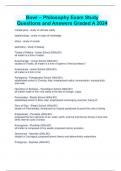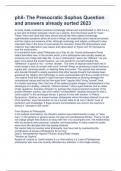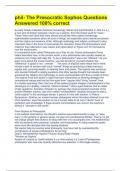Plato symposium Study guides, Class notes & Summaries
Looking for the best study guides, study notes and summaries about Plato symposium? On this page you'll find 26 study documents about Plato symposium.
All 26 results
Sort by

-
Plato Symposium 189c-194 complete translation and analysis
- Summary • 76 pages • 2023
-
- $9.68
- 1x sold
- + learn more
This document is a complete summary and analysis of all you need for the 2023-2024 Year 1 set text. Including extremely detailed style and content notes with 100% accurate interlinear translation at A* level. Within this 50+ slide PowerPoint, there are quizzes, explanations and wider context.
 Popular
Popular
-
Plato - Love and Relationships
- Summary • 29 pages • 2023
-
Available in package deal
-
- $9.68
- 1x sold
- + learn more
In depth analysis of Plato's views on love His philosophy explained - the Lysis, Symposium, the Forms, etc. Everything you need for Classics A-level love and relationships H408/32

-
Quiz Bowl – Philosophy Latest Update Graded A+
- Exam (elaborations) • 20 pages • 2024
- Available in package deal
-
- $9.99
- + learn more
Quiz Bowl – Philosophy Latest Update Graded A+ metaphysics study of ultimate reality epistemology study of origin of knowledge ethics study of morals aesthetics study of beauty Thales of Miletus Ionian School (500s BC) all matter is a form of water Anaximander Ionian School (500s BC) student of Thales; all matter is a form of apeiron ("the boundless") Anaximenes Ionian School (500s BC) all matter is a form of air Pythagoras Pythagorean School (500s BC) establ...

-
Bowl – Philosophy Exam Study Questions and Answers Graded A 2024
- Exam (elaborations) • 9 pages • 2024
-
Available in package deal
-
- $12.49
- + learn more
metaphysics - study of ultimate reality epistemology - study of origin of knowledge ethics - study of morals aesthetics - study of beauty Thales of Miletus - Ionian School (500s BC) all matter is a form of water Anaximander - Ionian School (500s BC) student of Thales; all matter is a form of apeiron ("the boundless") Anaximenes - Ionian School (500s BC) all matter is a form of air Pythagoras - Pythagorean School (500s BC) established school in Crotona, Italy; emphasize...

-
phil- The Presocratic Sophos Question and answers already sorted 2023
- Exam (elaborations) • 13 pages • 2023
-
- $12.49
- + learn more
As early Greek civilization became increasingly refined and sophisticated (c. 500 b.c.e.), a new kind of thinker emerged, known as a sophos, from the Greek word for "wise." These "wise men"(and they were almost exclusively men) asked increasingly sophisticated questions about all sorts of things, but especially about natural processes and the origins and essence of life. Although mythology and religion continued to play important roles in the lives of most people for centuries, these first p...

-
Philosophers questions and answers, latest updated
- Exam (elaborations) • 3 pages • 2023
-
Available in package deal
-
- $13.49
- + learn more
Philosophers questions and answers, latest updated Thomas Hobbes 17th-century English political philosopher who argued the need for a strong government in order to prevent people from falling into a save existence, which he called the state of nature; his book, Leviathan, which discusses the social contract and the separation of powers, serves as the basis for Western political thought St. Thomas Aquinas Italian philosopher and theologian; greatest Scholastic philosopher; changed the f...

-
phil- The Presocratic Sophos Questions Answered 100% correct
- Exam (elaborations) • 13 pages • 2023
-
- $22.49
- + learn more
phil- The Presocratic Sophos Questions Answered 100% correct As early Greek civilization became increasingly refined and sophisticated (c. 500 b.c.e.), a new kind of thinker emerged, known as a sophos, from the Greek word for "wise." These "wise men"(and they were almost exclusively men) asked increasingly sophisticated questions about all sorts of things, but especially about natural processes and the origins and essence of life. Although mythology and religion continued to play important ...

-
Symposium Discussion Forum 2 (#3)
- Other • 1 pages • 2023
-
- $16.39
- + learn more
the ancient Greece of Socrates, Plato, and Aristotle, a “symposium” was a banquet held after a meal, an “after-party” of sorts that usually included drinking, dancing, recitals, and engaging conversations on the topics of the day. For our purposes in this course, the Symposium discussions will not involve dancing, recitals, or a banquet, but they will provide food for thought on current ethical issues and direct application of the ethical theory discussed in each of these weeks. For t...

-
TEST BANK FOR MACIONIS GERBER SOCIOLOGY NINTH CANADIAN EDITION
- Exam (elaborations) • 681 pages • 2021
-
- $22.49
- + learn more
1. Explain why using our intuition about everyday behaviour is insufficient for a complete understanding of the causes of behaviour. 2. Describe the difference between values and facts and explain how the scientific method is used to differentiate between the two Despite the differences in their interests, areas of study, and approaches, all psychologists have one thing in common: they rely on scientific methods. Research psychologists use scientific methods to create new knowledge about the c...

-
Summery - Plato on Love, Desire & Homoeroticism
- Summary • 5 pages • 2023
-
- $5.16
- + learn more
Cheat sheet for Plato's ideals on love (including desire and homoeroticism) with a focus on his symposium which includes the ideas of Pausanias, Aristophanes, Agathon, Socrates/Diotima and Pheadrus. It also covers the tripartite soul, the forms, controlling and resisting desire and Plato's republic .

Do you wonder why so many students wear nice clothes, have money to spare and enjoy tons of free time? Well, they sell on Stuvia! Imagine your study notes being downloaded a dozen times for $15 each. Every. Single. Day. Discover all about earning on Stuvia


